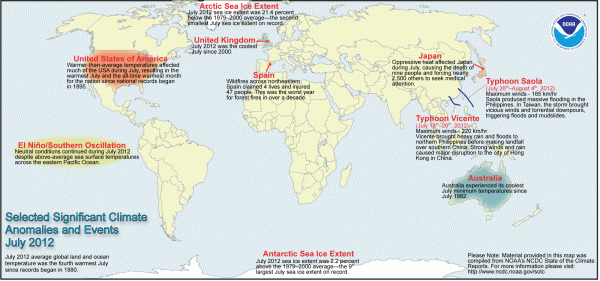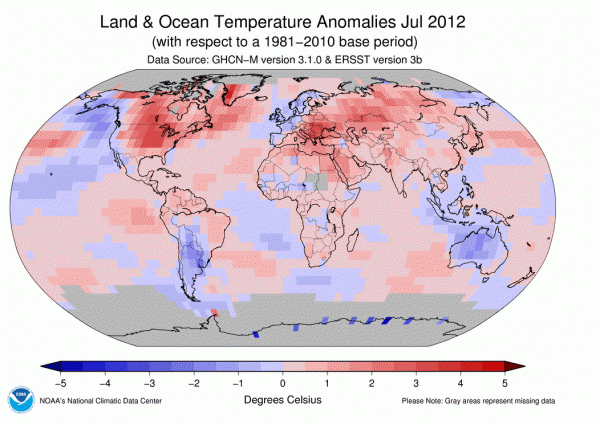I reported earlier this month that July 2012 was the warmest month ever recorded in the contiguous United States – not only the warmest July ever recorded, but the warmest month ever recorded since record-keeping began in 1895, according to the National Climactic Data Center (NCDC). In the Northern Hemisphere, the land temperature for the month of July was 0.92 degrees Celsius (1.66° Fahrenheit) above average. In the NCDC’s most recent climate report, released this past week, July 2012 is further identified the fourth-warmest July recorded globally since 1880. Intense heat reigned supreme across the United States, Greenland, and central/eastern Europe in July 2012. That’s probably why ice in Greenland set a new record for melting by August 8, 2012, about a month before the peak of melting season. The United Kingdom, meanwhile, had clouds, rain, and cooler temperatures in July. The coolest anomalies across the globe occurred in Alaska and Australia.

July 2012 was the fourth straight month in which the Northern Hemisphere set a new monthly land temperature record. The Southern Hemisphere, which is currently in the winter season, experienced temperatures slightly above average making July 2012 the 33rd warmest July on record, or 101st coolest on record based on a 133-year period of record.

Highlights from the NCDC report of weather extremes for July 2012:
-As mentioned in one of my previous posts, the United States experienced the warmest July AND month ever recorded with temperatures 1.8°C (3.3°F) above average.
-In Canada’s southern province, Ontario, temperature anomalies were nearly 3.5°C above average for the month of July.
-In The United Kingdom and Norway, cooler weather kept their temperature anomalies below average for July 2012. The United Kingdom experienced the coolest July since 2000. In Norway, temperatures were 0.3°C cooler than average making the country experiencing the 30th coolest July on record since records began in 1900.
-The July average global sea surface temperature was 0.50°C (0.90°F) above the 20th century average of 16.4°C (61.5°F), making this the seventh warmest July on record.
-Austria received very heavy rainfall across five states breaking monthly records. Austria’s capital, Vienna, saw rainfall that was more than 250 percent of its monthly average.
-Argentina experienced their driest July in 50 years. The driest areas occurred in the eastern and central areas of Argentina in the towns of Laboulaye, Pehuajó, and Dolores.

Bottom line: July 2012 was the fourth-warmest July globally since record-keeping began in 1880, and was the warmest July ever recorded for the Northern Hemisphere. Heat and dry weather dominated a large majority of the United States, while the completely opposite occurred in the United Kingdom where clouds, rain, and cooler temperatures influenced a large portion of the region in July. We are currently in an ENSO-Neutral phase, which means we are not in a La Niña or El Niño phase. However, by September, NOAA predicts we will be entering a weak El Niño phase, which means ocean temperatures are above average across the eastern Pacific ocean near the equator. The ENSO can play a large factor on the weather globally around the world. Some areas could experience more drought while others receive better chances for rain. August has already proven to be drastically different than July. Expect more changes in the August 2012 report that will be released by the middle of September.











